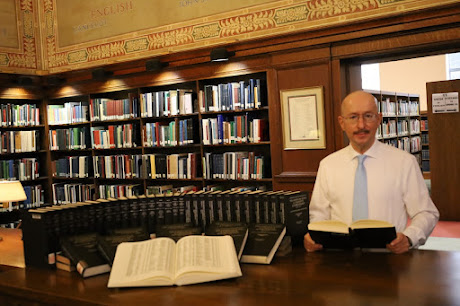BPL's Southern History Department Hosting DNA Testing for African Americans Workshop on February 15
 |
| Paul Boncella, map conservator of the Birmingham Public Library. |
Birmingham, Alabama- As map conservator at the Birmingham Public Library for over a decade, Paul Boncella has used his expertise to help educate citizens of Birmingham.
On Wednesday, February 15, from noon to 1:00 p.m. at the Central Library downtown, Boncella will share tips for African Americans on how to overcome the challenges they face while research their family tree. The workshop, DNA Testing for African Ethnicities," will take place both virtually via Zoom as well as in-person in BPL's Research Library in the 4th Floor RLCC Room.
Over the past few years during BPL’s celebration of Black History Month, he has
researched parts of Birmingham's dark past, including how in the early 1900s city
leaders used government laws to segregate black and white homeowners. In February
2020, Boncella shared tips on an African-American book volume BPL's Southern
History Department has to help Blacks explore their family tree.
In a recent interview, Boncella talked about the lecture with BPL’s PR Department.
BPL: The difficulties of finding information on loved ones who were enslaved is an
issue many Blacks face. Talk about some of the ways your workshop will address
helping them in the search for ancestors.
Boncella: Slavery erased the names and dates of their distant ancestors and the
knowledge of ancestral homelands. DNA testing can clarify connections to both
ancestors and homelands, but not all DNA tests are useful for either of these purposes.
Being able to distinguish the merits of specific tests will save them time and money.
BPL: What are some of the topics you will cover during this event?
Boncella: The most exciting of them will be how one company has invested heavily
in the creation of what surely is the richest database of African and African-American
DNA, along with the basics of DNA testing for ethnicities and an examination of two
companies that target people of African ancestry.
BPL: How do you hope this program benefits attendees seeking to navigate the
challenges that slavery causes when researching African-American ancestry?
Boncella: I want it to inspire hope in them. Too much has been said about the lack of
a paper trail, which is inevitable for every lineage at some point in the past. It is time
that we focus on something that can benefit anyone, harnessing the power of DNA for
genealogical research.
BPL: How did you identify the need for this topic as part of our Black History
Month programming?
Boncella: People often come to me with excitement about specialist African ethnicity
tests, and I have made it my business to investigate them. I am so concerned by what I
learned about some of these tests that I feel obligated to present an updated guide to
such products every year.
BPL: What do you hope viewers of this lecture learn?
Boncella: I want them to know how to make the fullest use possible of the
increasingly sophisticated ethnicity products that are becoming available. Also, I want
them to learn how their DNA testing choices can benefit both them and other
members of their population.
BPL: Anything else to add?
Boncella: Everyone who can do so should take a DNA test for ancestry. Our DNA
inheritance is far superior to that of the generations yet to come, and we owe it to
them to build this vital bridge to the past. Indeed, making good testing choices today
will put future members of our families and populations at an advantage when
Artificial Intelligence fully merges genetics and genealogy.
Comments